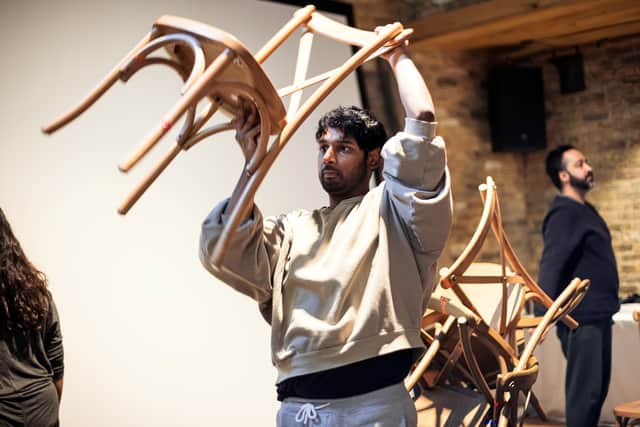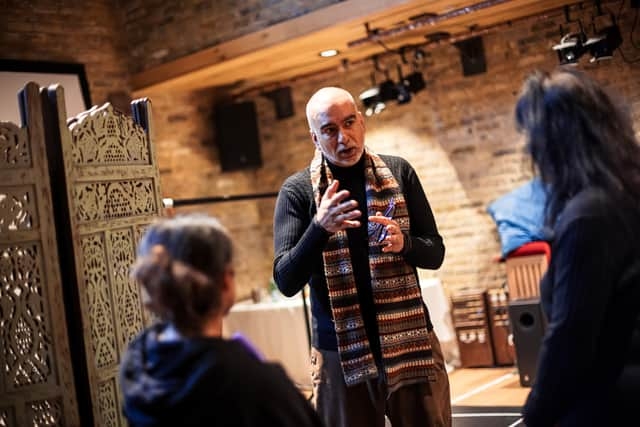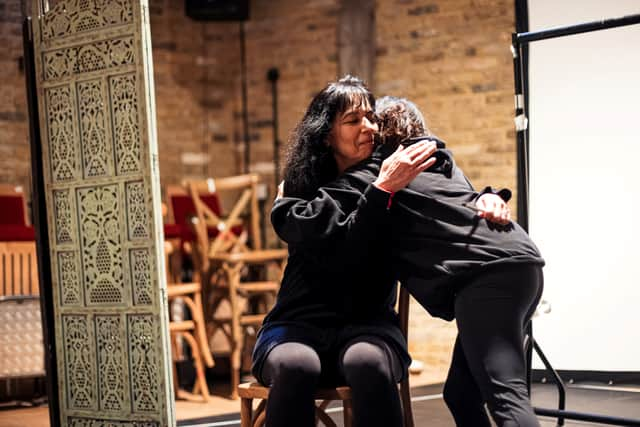The Partition of India is being re-told in a compelling theatre production in Birmingham
and live on Freeview channel 276
The compelling play SILENCE, which uses real life memories to re-tell the story of the Partition of the Indian subcontinent, comes to Birmingham Rep this April in a new adaptation.
Directed by The Rep associate director Iqbal Khan, the production looks not just at how the creation of modern India and Pakistan ripped apart a land and lives, it also explores its impact on the following generations.
Advertisement
Hide AdAdvertisement
Hide AdAdapted from journalist Kavita Puri’s highly acclaimed book and Radio Four series, Partition Voices: Untold British Stories, the play was originally created by Tara Theatre under its artistic director Abdul Shayek and premiered in London in 2022 to mark the 75th anniversary of Partition.
After a successful run at the Donmar Warehouse and Tara Theatre, the company intended to adapt and tour SILENCE under the directorship of Shayek but, following his sudden death last August, the theatre asked Iqbal to take the production forward.
“I knew Abdul very well both professionally and as a friend,” says Iqbal. “Tara approached me and asked would I be interested in doing this work and continuing the legacy of it and I felt honoured to do that, to both honour him but also I was very excited about the idea of finding a new way to do this show.”


Abdul and the team had already made some changes with developing the script and Iqbal, whose recent Rep productions include East is East and Tartuffe, has built on that still further. “The version that we are doing now is the new text but also it’s a brand new production,” he says. “There’s a whole new creative team with the designer, lighting, projection and music all different. Most of the actors are also new, so it feels like we are really repackaging it and trying to do the best version of that show for audiences around the country.
Advertisement
Hide AdAdvertisement
Hide Ad“There is an ensemble that tell the story and there is this poetic refrain that moves throughout the piece. We use projection in different ways that is both documentary but also with graphic visuals so every single story is told in a different way. Theatrically I hope it will be a very exciting, surprising and rich experience.”
What happened during the Partition of India?
The Partition in 1947 displaced more than ten million people, rupturing communities and sparking horrific violence between people who had formerly been friends and neighbours. Its scars are still felt today.
“We’ve had a lot of historians and politicians debating these issues but to actually hear the voices of people that went through it is so important,” explains Iqbal. “These aren’t people who have a Hindu or Muslim agenda, it’s a human agenda.
“SILENCE is not just a series of traumatic experiences, it’s a lot more complicated, generous and humane than that. It represents people who have heroic stories, funny stories, ultimately very moving stories and always surprising stories.
Advertisement
Hide AdAdvertisement
Hide Ad“I think it will resonate with audiences who recognise it or have experience of it but also there will be generations of British Asians who I think will look at this history and not know all the stuff that went on. And for the broader audience, it’s a part of British history that absolutely needs to be told in this way.”
Adapted by Sonali Bhattacharyya, Gurpreet Kaur Bhatti, Ishy Din and Alexandra Wood, Silence also explores the impact of Partition in the years that followed. “In the show there are stories from the time but we also have younger generation voices so it’s both the experiences of those who went through it and also the legacies of Partition,” explains Iqbal. “So it helps us understand what happened then but also to understand how it has affected this generation.”


And there can be lessons learnt for people everywhere in our current political and social climate. “Partition was an experience where an existing country was divided along religious lines and divisions were imposed upon communities who up to that time, for centuries, had lived in relative harmony with each other.
“I feel like particularly now there is the constant pressure to identify with a flag or a specific set of values and not embrace the fact that we are all a collection of many identities.
Advertisement
Hide AdAdvertisement
Hide Ad“Anything that we can do that resists that reduction in our possibilities and our abilities to co-exist with people of difference and to embrace the differences within us feels an important thing to do.”
Why is the new adaptation of SILENCE coming to Birmingham Rep?
The Rep is an ideal venue for the show, says Iqbal, who was born in Birmingham and directed the Opening Ceremonies of the 2022 Commonwealth Games for the city. “In Birmingham there’s a massive community of people from that part of the world who settled here and are a massive part of what Birmingham is now. It’s important for them to understand their history and the legacies of it but also for wider Birmingham to understand the extraordinary journeys of these people and how that has influenced British history.”
The show’s title SILENCE reflects the fact that so many of these experiences remained unspoken for decades. “A lot of that generation chose to be silent and it wasn’t always to do with trauma,” Iqbal explains. “It wasn’t a compelled silence, it was a pragmatic silence because a lot of them chose to compartmentalise and to get on with their lives.
“They drew their lines to ensure their children weren’t saddled with the trauma they had experienced. It feels like an extraordinary thing to do to absorb that, not to pass the trauma on and to concentrate on making lives for themselves and their children here. But there are lots of different kinds of silence and it’s important to break that silence.”


Advertisement
Hide AdAdvertisement
Hide AdAnd in doing so, the production also pays testimony to people’s incredible ability to move forwards. “This isn’t necessarily the story of victims, this is the story of survivors and that is why it’s an aspirational story,” says Iqbal. “There’s an extraordinary resilience about these people and I think it’s appropriate that we honour that.
“I hope audiences will have an admiration for these extraordinary people who survived and then went on to thrive in this country. I hope they will have a more generous sense of what this history was, what actually happened at the time, and I hope they will also take away a richer sense of who we are now and the possibilities for multicultural Britain.”
SILENCE plays Birmingham Rep’s Studio between April 23-27, see www.birmingham-rep.co.uk for more information and tickets.
Comment Guidelines
National World encourages reader discussion on our stories. User feedback, insights and back-and-forth exchanges add a rich layer of context to reporting. Please review our Community Guidelines before commenting.